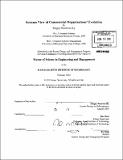Systems view of commercial organizations' evolution
Author(s)
Nemirovsky, Sergey
DownloadFull printable version (14.95Mb)
Other Contributors
System Design and Management Program.
Advisor
Dov Dori.
Terms of use
Metadata
Show full item recordAbstract
Organizational structure has a significant impact on performance of organizations and the way companies utilize their resources, develop new products and compete in the marketplace. As companies mature and grow, they undergo several developmental stages, characterized by different organizational structures and management styles used. The questions that this research aims to answer are: (1) What are the reasons for success and failure of various management styles? (2) What reasons or constraints render certain management styles obsolete or inadequate as an organization develops? (3) Based on the knowledge gained, what are the guidelines for applying different management styles in organizations at various stages of their growth, whether naturally or through mergers & acquisitions? This research recapitulates the concepts and principles of General System Theory and Universal Organizational Theory (Tektology) to establish the theoretical and philosophical basis for general methods and frameworks of evaluating complex systems. The broad approach to the studies of organizational structures and evolution is motivated by the conviction that all systems evolve under the influence of the same forces and are subject to the same general principles and universal laws of systems. Therefore, the general system methodologies and frameworks can be applied to solve problems faced by a variety of commercial organizations. This research confirms that a vast majority of modem organizations are based on division of labor, the principle formulated by Adam Smith in 1776. As the complexity of individuals' tasks is being reduced through specialization of labor and knowledge, and complexity of systems increases, more complex organizational structures evolve. Common trends of the organizations' evolution are analyzed. This analysis evaluates each stage of the organizational evolution model aiming to identify organizational structures and management styles most suitable at each developmental phase. As each stage of organizational development is characterized by a period of growth followed by a crisis, the management tends to overemphasize the aspects of organizational behavior that helped solve a previous crisis, inevitably causing the next one. The research highlights the necessity for a balance among several key aspects of organizational performance in order to remain successful at each phase.
Description
Thesis (S.M. in System Design and Management)--Massachusetts Institute of Technology, Engineering Systems Division, 2010. Cataloged from PDF version of thesis. Includes bibliographical references (p. 95-99).
Date issued
2010Department
System Design and Management Program.; Massachusetts Institute of Technology. Engineering Systems DivisionPublisher
Massachusetts Institute of Technology
Keywords
Engineering Systems Division., System Design and Management Program.